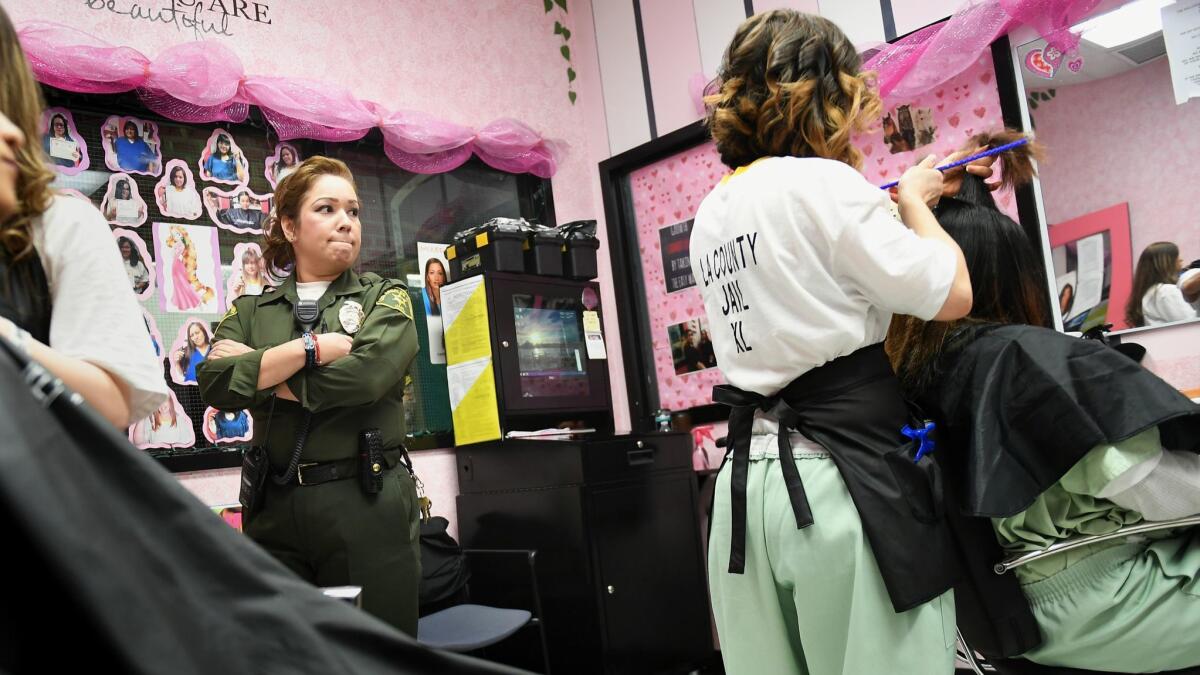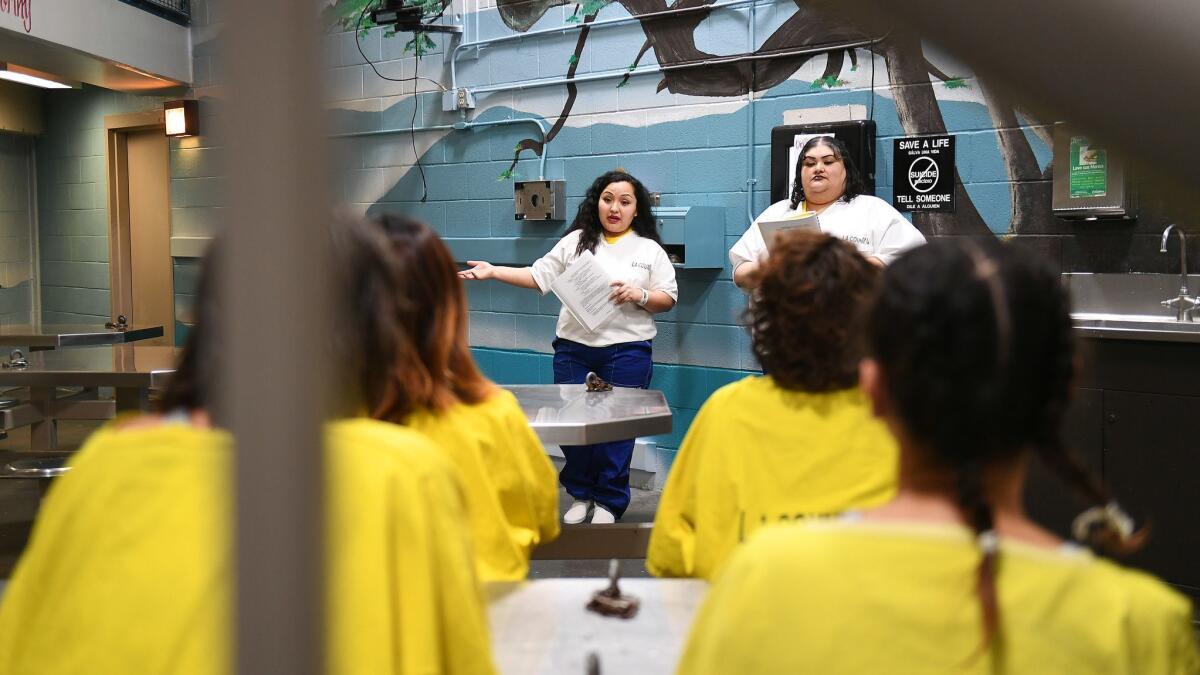L.A. County women’s jail lags behind national standards on preventing sexual abuse, report finds

One of the nation’s largest women’s jails is not meeting standards required by the federal Prison Rape Elimination Act.
- Share via
A month after a guard was arrested on suspicion of sexually assaulting inmates at the women’s jail in Lynwood, auditors touring the lockup noted a number of troubling practices that could lead to sexual abuse.
Some women were visible while they showered. Although inmates can report sexual misconduct, those with keys to the complaint boxes included sergeants who might be the targets of the accusations.
Even a seemingly innocuous job title was problematic: An officer who monitors different areas of the jail was called a “prowler” — a term, the auditors noted, that conjures a stalker of prey.
Those are among several concerns cited in a preliminary report, which concludes that the Century Regional Detention Facility — one of the nation’s largest women’s jails — is not meeting standards required by the federal Prison Rape Elimination Act.
At least 400 county jails in the U.S., including about 20 in California, have met the rules under the 2003 law, which mandates basic safeguards to curb sexual assault and sexual harassment behind bars.
The independent review, conducted in October and released publicly last month, was requested by the Los Angeles County Sheriff’s Department to provide a road map to fulfilling requirements under the prison rape law. The sheriff runs the women’s jail and six other lockups as part of the nation’s largest jail system. None has met the guidelines, which were finalized in 2012.
Although not a final audit, the 138-page document provides a detailed accounting of how the Sheriff’s Department, in the midst of reforming its troubled jail system, is lagging behind national benchmarks to ensure inmate safety.
An estimated 200,000 inmates in U.S. jails and prisons — women and men — are sexually victimized each year, according to the most recent federal statistics. Of the 16,600 inmates in the L.A. County jail system, roughly 2,100 are women.
“It’s a bit shocking to see that they didn’t pass anything,” said Patti Giggans, a member of the Sheriff Civilian Oversight Commission who heads the group’s ad hoc committee on the prison rape law.
Giggans acknowledged that the jail system faces legitimate obstacles. Those include complicated rules governing jail access for advocates of sexual assault victims and an outdated computer system — factors that would delay compliance with the law.
“It’s going slower than anybody wants, but we just have to keep up the pressure,” said Giggans, who is also executive director of Peace Over Violence, a rape crisis center.
Although the oversight commission can make recommendations and issue reports, it has no power to force Sheriff Jim McDonnell to take action.
Still, McDonnell said making the changes demanded by the prison rape law “is a tremendous priority.”
“We’re committed to making sure those inmates in our care and custody are treated as well as we can provide for them,” he said. He said he hopes to hire more staff to reach those goals, adding that current employees are “stretched very thinly” and it has been difficult to recruit deputies.
The preliminary audit, released in response to a public records request from the Los Angeles Times, was financed by the PREA Resource Center, an organization that oversees implementation of the prison rape law nationwide.

The women’s jail fell short of some standards because the department withheld documents, auditors noted. For example, jail officials said they don’t hire anyone with a history of sexual misconduct, but they refused to provide documentation to corroborate the claim.
One of the most notable problems was the lack of screening to assess inmates’ risk of sexual victimization, said Amanda Goad, a senior staff attorney at the American Civil Liberties Union of Southern California who focuses on LGBTQ rights and improving conditions for incarcerated people.
Goad said many people in jail have already experienced sexual trauma in their lives, putting them at acute risk for further abuse and retaliation in custody. The audit found that Century jail staff involved in intake, medical care and mental health “revealed they do not understand how to assess sexual safety or the purpose of doing so.”
“It’s infuriating,” Goad said. “There is this perception that sexual assault is just part of the penalty for people who are incarcerated.”
When news broke in September of the arrest of 31-year-old Giancarlo Scotti, a deputy at the women’s jail accused of sexually assaulting six inmates, a sheriff’s official said the allegation being filed was an example of the system working properly.
“The good thing about what happened is the women felt safe enough to report,” Karen Dalton, the Sheriff’s Department’s PREA coordinator, said last fall.
But the process for inmates to complain about sexual misconduct — and measures to ensure that they are not retaliated against for doing so — were among key flaws the report cited.
Inmates could report abuse verbally or in writing to staff, but the procedure did not guarantee the grievances would always reach the proper authority or result in corrective action, according to the audit. Alternatives, including a Crime Stoppers telephone line and an email address for third parties to submit complaints, were inoperable, auditors found.
“At least two CRDF inmates revealed that allegations of sexual abuse and sexual harassment had been made to staff and summarily ignored,” the report said.
Michele Ynfante said she was sexually assaulted by a deputy at the Century lockup when she was held there in 2011. She said no one was held accountable after she complained.
A weak complaint process can inflict psychological harm on those returning to the community, said Ynfante, who is now an activist with Dignity and Power Now, a group that advocates for incarcerated people and their families.
“You release a bunch of people who are angry and upset because no one listened to them,” she said.
The Sheriff’s Department has been working on improvements the past five years and paid $216,000 in federal grant money to a health and human rights organization, Just Detention International, to help draft new policies.
Some practices have changed: Males guards now announce themselves when they enter a dorm. The jail also gives inmates a pamphlet on their rights and how to report sexual abuse. Posters throughout the jail reinforce the message. The department has also created a video on the issue for inmates to view during intake.
But the department has yet to implement broader policy recommendations that would meet PREA guidelines. For example, it has failed to establish a uniform system for collecting data on complaints and documenting outcomes. As a result, auditors were not able to establish the total number of alleged sexual assault and harassment incidents at the jail in recent years. In addition, many staff who may hear of allegations first said they hadn’t been trained in how to properly respond to a victim or preserve evidence.
Dalton, of the Sheriff’s Department, said data systems and inmate screening must be revamped to carry out some policies. In a statement, spokeswoman Nicole Nishida said sheriff’s officials appreciate the information in the interim audit and hope the L.A. County Board of Supervisors will approve more funding to make changes.

Although state prisons can lose some federal funding for not complying with the prison rape law, county jails generally face no such penalty. Still, a county could be liable if a sexually abused inmate filed a lawsuit and used a failed PREA audit as evidence that a facility was not meeting its constitutional obligation to prevent abuse.
Three inmates told a reporter visiting the Century lockup last fall that they felt safe and benefited from parenting, domestic violence awareness, and other programs inside the jail.
“The deputies are positive,” said Josefina Ramirez, 38, who was selected by jail officials to speak. “In the street you know them as the cops that are your enemies, but they’re not. They’re wonderful people like us.”
None of the women were allowed to talk privately. Several guards, citing security concerns, stood in the interview room. One took notes.
Dalton said there is no deadline for when the Century facility or any of the L.A. County jails must satisfy the mandates under the prison rape law.
Twitter: @mayalau
More to Read
Sign up for Essential California
The most important California stories and recommendations in your inbox every morning.
You may occasionally receive promotional content from the Los Angeles Times.











